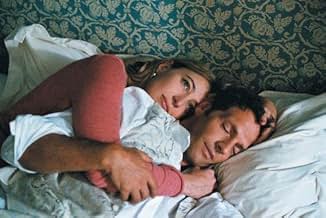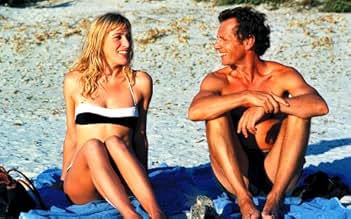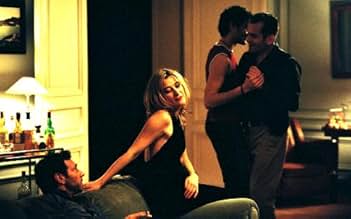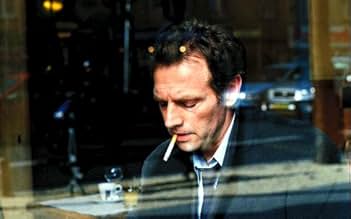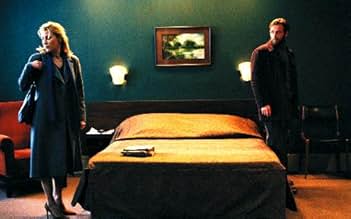5x2
- 2004
- Tous publics
- 1h 30m
IMDb RATING
6.6/10
11K
YOUR RATING
Five stages in the romance between a woman and a man.Five stages in the romance between a woman and a man.Five stages in the romance between a woman and a man.
- Director
- Writers
- Stars
- Awards
- 1 win & 2 nominations total
Valeria Bruni Tedeschi
- Marion
- (as Valeria Bruni-Tedeschi)
Ninon Brétécher
- Sophie
- (as Ninon Bretecher)
- Director
- Writers
- All cast & crew
- Production, box office & more at IMDbPro
Featured reviews
A film that suggests a cross between Bergmans's gut-wrenching "Scenes From a Marriage" (1973) and Stanley Donen's more lighthearted "Two For the Road" (1967), mixed in a bit with that backwards "Seinfeld" episode, "5X2" (2005) is a very fine adult drama from director Francois Ozon. As the title suggests, it is comprised of five short glimpses at the doomed relationship of a handsome professional couple, Marion (Valeria Bruni-Tedeschi) and Gilles (Stephane Freiss). As in "Two For the Road," we see unchronological snapshots of this couple's failing marriage, but unlike the '67 film, rather than being given scattershot scenes from various periods, here we proceed continuously backward in time: from the divorce settlement and its rather icky aftermath, backward to one of the couple's dinner parties, back still to the birth of their premature son, on to their wedding party (and a most unusual wedding night, to put it mildly), and all the way back to one of their first meetings. Our foreknowledge that the couple's marriage is doomed makes the cracks in Marion and Gilles' relationship stand out all the clearer. Consequently, the pretty, upbeat ending is rendered bittersweet at best, with our preglimpse of what their future holds. "5X2" has been finely put together and features sterling acting down to the smallest bit players. It was especially great for me seeing that grand old actor, Michael Lonsdale (who will always be Hugo Drax for us Bond fanatics), still acting at age 74, here playing Marion's father. My only complaint, really, concerning "5X2" is that it is a bit on the short and sketchy side; perhaps a few extra scenes would have enabled us to more fully understand the characters' motivations, particularly Gilles' (and especially his no-show at his son's birth). This, for me, is the only thing that prevents "5X2" from being a perfect 10.
10meitschi
As another reviewer before me, I also can't believe how badly people are writing about this film here. I adore Francois Ozon and I've seen all his feature-length films. This one seems quite different from the others (except, maybe, Sous le sable) and it's as low-key as Ozon could ever get, but it is still an excellently scripted and played film that makes one think.
I didn't consider the backwards structure to be gimmicky at all, it rather helped the viewer to better make out flaws early in the relationship. There is betrayal in each one of the episodes, starting with the last (chronologically the first) one. The film shows us that even little egoisms and uncharitable behavior can lead to grave consequences - in this case, to divorce. The woman, Marion, seems to be easily led anywhere, not having enough standing of her own, while the man, Gilles, seems to be egoistic, cowardly and sometimes just simply sex-crazed.
I think the structure rather helps us to understand the characters better, since we have already seen the consequences of their actions and attitudes. I didn't consider the large gaps between (and also in) the episodes to be a problem - they only acknowledge that the whole story can never be told because it is made up by every single moment between their first meeting and the last time they see each other. These episodes can only indicate what went wrong, they cannot explain - that would be too simplistic.
The actors were excellent, especially Valeria Bruni-Tedeschi. The way the looks of the main characters changed during the film (becoming more and more youthful and fresh as the story goes backwards), was also excellently done.
The parallel love stories (between Gilles's brother and his young lover, and between Marion's parents) shed some more light on the relationship between Marion and Gilles - also on what might have gone wrong.
This film should probably be required viewing for every couple wanting to get married... :-) Not in order to deter them, but rather to make them aware of the pitfalls of relationships and married life.
I didn't consider the backwards structure to be gimmicky at all, it rather helped the viewer to better make out flaws early in the relationship. There is betrayal in each one of the episodes, starting with the last (chronologically the first) one. The film shows us that even little egoisms and uncharitable behavior can lead to grave consequences - in this case, to divorce. The woman, Marion, seems to be easily led anywhere, not having enough standing of her own, while the man, Gilles, seems to be egoistic, cowardly and sometimes just simply sex-crazed.
I think the structure rather helps us to understand the characters better, since we have already seen the consequences of their actions and attitudes. I didn't consider the large gaps between (and also in) the episodes to be a problem - they only acknowledge that the whole story can never be told because it is made up by every single moment between their first meeting and the last time they see each other. These episodes can only indicate what went wrong, they cannot explain - that would be too simplistic.
The actors were excellent, especially Valeria Bruni-Tedeschi. The way the looks of the main characters changed during the film (becoming more and more youthful and fresh as the story goes backwards), was also excellently done.
The parallel love stories (between Gilles's brother and his young lover, and between Marion's parents) shed some more light on the relationship between Marion and Gilles - also on what might have gone wrong.
This film should probably be required viewing for every couple wanting to get married... :-) Not in order to deter them, but rather to make them aware of the pitfalls of relationships and married life.
5x2 comes as a slight let-down following director Francois Ozon's recent critical and commercial success with Swimming Pool.Ozon's decision to structure the film in an anti-linear fashion is nothing original and he himself admits he was influenced by Jane Campion's little-known TV film Two Friends (1985) which used the same structure. Ozon chooses 5 crucial scenes from the life of Marion and Gilles, a middle-class couple with a son, Nicholas, whose married life quickly disintegrates into divorce. Ozon begins with the austere divorce, finishing with the moment this would-be-couple met.
The reverse structure allows the viewer to consider what went wrong and decipher why the marriage ended so bitterly. It is fairly obvious the reasons why they divorced, but Ozon and his frequent collaborator, Emmanuelle Bernhein, are as interested in the psychological worlds of these two people as their mundane reality.
The film works for the most part, but some scenes are unbelievable: Gilles's boastful confession at the party with his brother; the scene in the woods with Marion and an American tourist. These scenes undermine the subtle nature Ozon employs elsewhere. He explains too much, which isn't his style. A better edit would have made this an even better film.
As for the music, the corny 1960's Italian love songs used to close each segment are plain awful. The triviality of the songs might offer an ironic counterbalance to what is happening on screen, but the effect is of a sneering, sardonic detachment on behalf of the director. It's as if Ozon wants to dismiss every aspect of romantic culture as a fallacy.The best musical segment is at the end where Ozon's longtime composer Philippe Rombi returns some panache to the film's audio sensibilities. Special mention should go to Paolo Conte's haunting Sparring Partner which is used in the dinner scene and in the final credits.
The acting is excellent,and the closing frame is a masterstroke.But it doesn't merit that many repeat viewings as his earlier Swimming Pool did.
The reverse structure allows the viewer to consider what went wrong and decipher why the marriage ended so bitterly. It is fairly obvious the reasons why they divorced, but Ozon and his frequent collaborator, Emmanuelle Bernhein, are as interested in the psychological worlds of these two people as their mundane reality.
The film works for the most part, but some scenes are unbelievable: Gilles's boastful confession at the party with his brother; the scene in the woods with Marion and an American tourist. These scenes undermine the subtle nature Ozon employs elsewhere. He explains too much, which isn't his style. A better edit would have made this an even better film.
As for the music, the corny 1960's Italian love songs used to close each segment are plain awful. The triviality of the songs might offer an ironic counterbalance to what is happening on screen, but the effect is of a sneering, sardonic detachment on behalf of the director. It's as if Ozon wants to dismiss every aspect of romantic culture as a fallacy.The best musical segment is at the end where Ozon's longtime composer Philippe Rombi returns some panache to the film's audio sensibilities. Special mention should go to Paolo Conte's haunting Sparring Partner which is used in the dinner scene and in the final credits.
The acting is excellent,and the closing frame is a masterstroke.But it doesn't merit that many repeat viewings as his earlier Swimming Pool did.
The end and beginning of the love of the French couple Marion (Valeria Bruni-Tedeschi) and Gilles (Stéphane Freiss) is disclosed backwards through five moments in their lives:
1st moment: They divorce and have one last brutal intercourse without love.
2nd moment: With their relationship shaken, they have a dinner party with Gilles's gay brother Christophe (Antoine Chappey) and his younger mate, when an infidelity is disclosed at the dinner table.
3rd moment: The troubled pregnancy of Marion and the delivery of their premature son Nicolas, with the total absence of Giles.
4th moment: Their wedding, when Marion commits adultery with an unknown guest of the hotel.
5th moment: .When they meet each other in an Italian resort and begin their relationship.
This simple and realistic movie recalls "Irreversible" (2002), since the screenplay discloses five moments of the relationship of a couple chronologically backwards. I believe the first intention of François Ozon is to remember that behind every divorce, there is a couple that loved each other in the past, that decided to marry each other expecting to live together and raise a family of their own. However, relationships usually deteriorate and time destroys everything including love. In these fragmented glimpses of the lives of Marion and Gilles, the viewer does not see exactly when their love ended, but after their initial encounter, there are many signs suggesting the beginning of the end: the adultery of Marion in the wedding night; the absence of Gilles in the birth of his son; his consented participation in an orgy in the presence of Marion, visibly showing one sort of last attempt to save their empty marriage. Further to the good screenplay, the outstanding and strong performances of the sexy Valeria Bruni-Tedeschi and Stéphane Freiss give the credibility to the characters. My vote is seven.
Title (Brazil): "Amor em 5 Tempos" ("Love in 5 Times")
1st moment: They divorce and have one last brutal intercourse without love.
2nd moment: With their relationship shaken, they have a dinner party with Gilles's gay brother Christophe (Antoine Chappey) and his younger mate, when an infidelity is disclosed at the dinner table.
3rd moment: The troubled pregnancy of Marion and the delivery of their premature son Nicolas, with the total absence of Giles.
4th moment: Their wedding, when Marion commits adultery with an unknown guest of the hotel.
5th moment: .When they meet each other in an Italian resort and begin their relationship.
This simple and realistic movie recalls "Irreversible" (2002), since the screenplay discloses five moments of the relationship of a couple chronologically backwards. I believe the first intention of François Ozon is to remember that behind every divorce, there is a couple that loved each other in the past, that decided to marry each other expecting to live together and raise a family of their own. However, relationships usually deteriorate and time destroys everything including love. In these fragmented glimpses of the lives of Marion and Gilles, the viewer does not see exactly when their love ended, but after their initial encounter, there are many signs suggesting the beginning of the end: the adultery of Marion in the wedding night; the absence of Gilles in the birth of his son; his consented participation in an orgy in the presence of Marion, visibly showing one sort of last attempt to save their empty marriage. Further to the good screenplay, the outstanding and strong performances of the sexy Valeria Bruni-Tedeschi and Stéphane Freiss give the credibility to the characters. My vote is seven.
Title (Brazil): "Amor em 5 Tempos" ("Love in 5 Times")
10ellkew
This is one of the most resonant films I have seen for a long time. Superb performances by both leads and a simple but very effective structure. To begin at the end and move backwards to look at moments, glimpses, fragments is such a simple device yet devastatingly effective as demonstrated with such expertise by Ozon here. I found certain moments deeply moving such as the physical assault on his wife. It seemed like a desperate attempt by the husband to try and claim power over his wife. But we know that the relationship is in the final throes of death. I loved the scene on the wedding night when she looks at her mother and father who we have previously seen rowing, just dancing alone at the reception. Somehow you know that their relationship will last and there is hope for them. The adultery the wife commits seemed to work although at first I thought it too contrived. Her pleasure on seeing her husband and love for him as he sleeps when she creeps back into the room felt very real. For me however the most beautiful and most moving sequence was the end when they first meet. It was wonderfully set up and echoed real life so well. It is always a series of events, a chain that causes all the pieces to fall in the right place and the couple to meet. It such a subtle scene when they talk on the beach as we know they are about to fall in love. When they walk into the golden sea bathed in light the two are literally becoming one as they embark on a new chapter in both their lives. The beauty of the scene is made more powerful by the conflicting emotion in our minds as we know that this love will be destroyed. How can something so perfect ever diminish? What Ozon is saying is that all things must die, that surely it is better to have loved and lost than never to have loved at all. Go and see this film. It is marvellous.
Did you know
- TriviaIn the French edition of the DVD, the director offers a version of the movie titled "2 x 5". This version shows the five sequences in the chronological order, from the moment the couple meets till their divorce. Subtle editing work has been applied to make the movie work.
- GoofsThe scene where the American came to Marion during the wedding night and introduced himself who arrived in France today and would leave tomorrow for LA. Who would just do that? It's just lame.
(Answer: someone not coming from the USA, for instance.)
- How long is Five Times Two?Powered by Alexa
Details
- Release date
- Country of origin
- Official sites
- Languages
- Also known as
- Cinq fois deux
- Filming locations
- Production companies
- See more company credits at IMDbPro
Box office
- Budget
- €5,250,784 (estimated)
- Gross US & Canada
- $128,752
- Opening weekend US & Canada
- $15,667
- Jun 12, 2005
- Gross worldwide
- $7,444,906
- Runtime1 hour 30 minutes
- Sound mix
- Aspect ratio
- 1.85 : 1
Contribute to this page
Suggest an edit or add missing content


